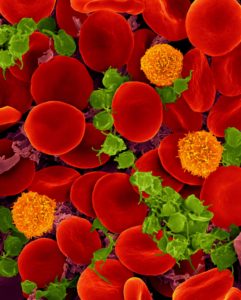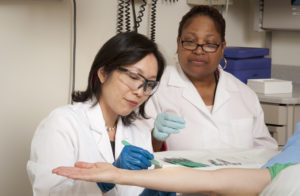Project MALETH will contribute the first scientific and biomedical programme from Malta to be sent to the International Space Station. It will also be the first Maltese experimental setup to be conducted outside of the Earth’s atmosphere.
This programme, named SpaceOMIX, consists of two applications:

Human blood with red blood cells, T cells (orange) and platelets (green). © Dennis Kunkel, Dennis Kunkel Microscopy, Inc.
Outer space provides an environment that differs from a planetary one in several aspects, primarily regarding gravity (which is lower than that on Earth) and radiation (which is higher than that on Earth). This presents unique opportunities for exploring biological and medical processes in different conditions.
Diabetic patients are prone to suffer from skin conditions, such as wounds or ulcers, as a result of an altered skin microbiome, which can complicate medical treatment. In Malta, around ten new cases of such a challenging nature appear every week, with each case requiring urgent medical attention and sometimes necessitating amputation of toes or even limbs.
Findings from Project MALETH, then, may have implications for short-term and long-term clinical problems here on Earth, such as this and others arising in the future.

Collecting skin microbiome samples. © Rhoda Baer/ National Institute of Arthritis and Musculoskeletal and Skin Diseases (NIAMS)
A ‘biocube’ built by Space Applications Services as part of their International Commercial Experiment (ICE) Cubes Service will house the SpaceOMIX samples and will be launched as part of the SpaceX mission SpX 23. This mission, contracted by NASA, will use the spacecraft Cargo Dragon 2 to fly the biocube to the International Space Station.
Comparative analysis of the retrieved samples and the Petri dish samples will deliver the anticipated results, including those resulting from an exploration of the samples’ molecular genetics and bacterial gene expression.
A team of experimental haematology and molecular genetics specialists from the University of Malta is responsible for the concept and the content of the biocube. The team is spearheaded by Prof. Joseph Borg, president of the Malta Association of Biomedical Scientists.
Other collaborators include Afshin Beheshti, from the NASA Ames Research Centre, and Christopher Mason, from Weill Cornell Medicine in the United States.
The biocube with the samples will be launched from the United States on the 18th of August.
This will occur at Cape Canaveral in Florida, a site which also served as a launching pad for other historically significant space missions such as Gemini, Apollo, and Skylab.

Illustration of the SpaceX Crew Dragon and Falcon 9 rocket during the company’s uncrewed In-Flight Abort Test for NASA’s Commercial Crew Program. © SpaceX